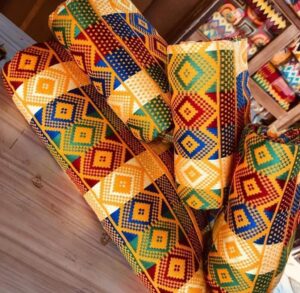Culture as defined by Hofstede, is “the collective programming of the mind that distinguishes the members of one group or category of people from another”. This involves all the ways of life including arts, beliefs, codes of manners, language, dress code, religion and rituals.
The Ghanaian culture holds rich and distinct customs and traditions that can never be underestimated. From the languages spoken to the style of dressing and family systems, the rich Ghanaian culture is well projected. It is noteworthy that urbanisation, intermarriages, and civilisation are gradually eroding the traditional customs and values that underpin our cultural uniqueness.
Previously, ‘smock’ was the traditional wear for the Northerners, as Kente was for the Ashantis. Today, we find more southerners wearing smocks of different colours and designs to funerals, churches and other events. Also, the display of colourful Kente during traditional marriages has become a national phenomenon. Indeed, this generation is embracing cultural diversity and it is an indication of how far we have come as a nation.
Place marketing, entrepreneurship and innovation at the heart of the Kente industry and they could be the game changer as they have the potential of generating revenue for the country. Unfortunately, the industry is impoverished and gradually the country is losing its grip on the title deed.
Growing up, cotton plants were ubiquitous – found at almost every backyard not only in the villages, but also the in cities of Ghana. This was the period when terms such as ‘sirikye ahoma’ – silk yarn, ‘nsennua’ – loom and several others dominated the conversations of natives in most Kente weaving communities.
One may call those days ancient but we manufactured our own yarns to weave the Kente, and we could boast of the best and quality Kente that projected our culture and heritage. A peculiar thing about Kente is that only the males are involved in the weaving, and when males as young as six years display in the loom, it is a sight to behold.
Fast forward, in this 21st century period of ‘our civilization’ and modernisation, as a country, we hugely rely on the importation of these materials, even cotton yarn before the Kente production can take place. The question is, who controls the Kente industry now? Is it now a Ghanaian-Chinese collaboration? Must we import everything? Where lies our pride and capabilities as a nation. Why must we harness this myopic mindset?

If ‘marketing’ is defined as “the activity, set of institutions and processes for creating, communicating, delivering and exchanging offerings that have value for customers, clients, partners, and society at large”, what then is the marketing impact of the Kente industry? The centre can no longer hold. The reality is that the Kente industry is currently at the ICU and hopefully, the 1D1F, if carefully and strategically rolled out could be a ventilator (life support).
Natives of the Kente communities rely on the industry for survival. In that, the male child is introduced to it at a very tender age between five and nine.
In the year 2020 when COVID-19 pandemic was at its peak, there was shortage of raw materials as importation was stalled and the industry was under a serious threat. Today, the cedi has depreciated drastically and prices of these raw materials keep rising every day. Must we rely on importation for everything as a nation? Does the Kente now belong to the Chinese? Or has it become a shared glory? Our own people carried these sophisticated and quality designs to the Chinese to print them as textiles because of greed; and our leaders are silent on that. As if that was not enough, we now rely on the Chinese to manufacture yarns before we can weave, and we are adamant as a nation. It is about time we woke up from our slumber and be proactive.
Some actors in the industry have this to say:
Three of my four children have graduated from the university and are working in the city. I also take care of my nephews and nieces. I own two storey buildings, all from the profit that I made from the Kente business. But the industry is no longer lucrative due to the high importation of raw materials and the Kente textile. I will not advise any of these young ones to enter into the business because there is no future. (Anonymous Kente seller at Sakra Wonoo)
We have vast fertile lands to support the growing of cotton but where are the policymakers? It seems no one cares about the collapse of the industry. (Anonymous Kente weaver at Safo)
Consider the direct employment that will be created if the Kente industry is well regulated: cotton growing, processing, yarn manufacturing, and that could be spread across the Kente weaving communities. (Anonymous Kente weaver and seller at Adanwomase)
The sad reality is that the industry is speedily collapsing, and the earlier policymakers acted, the better for us. We can start by building modern weaving centres, abolish the importation of the pirated Kente textiles, grow our own cotton, and produce in large quantities for importation just as we do with other natural resources. We can as well organise Kente festivals where Kente from all spheres of the nation will be displayed and buyers can have them at affordable prices during such seasons. This industry can earn the country foreign exchange, and the 1D1F would not only become a fruit juice initiative but a reality that directly impacts the lives of the people of Ghana.










